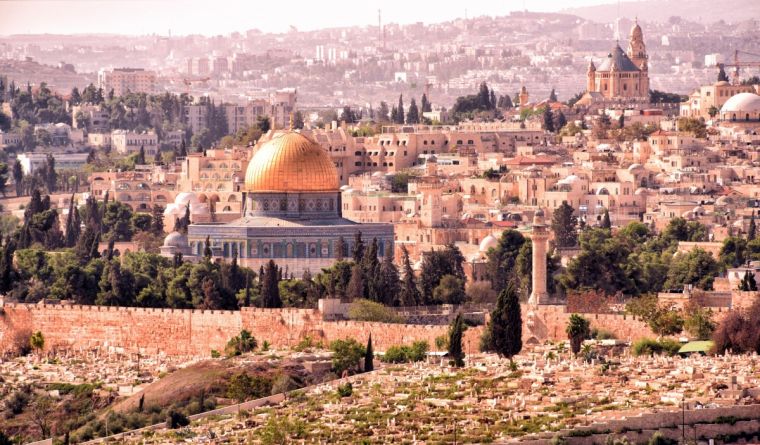Can President Trump 'do a deal' on Israel-Palestine?

It has eluded presidents, prime ministers and prelates since the 1940s, but one significant Christian voice thinks Donald Trump might be able to make progress on peace in Israel-Palestine.
The Archbishop of Canterbury, Justin Welby, is in Jerusalem this week and spoke to Christian Today about Trump's potential. 'His office has the capacity to make a difference,' Welby argued,'It's one of the very few offices in the world outside this region that does. And so we pray for him to be able to do that...I've never met him, I don't know him at all, but he will be in my prayers.'
Of course Welby is right. History shows that the closest we have come to seeing a peace deal between Israelis and Palestinians has been when the leverage of the White House has been brought to bear in a concerted way.
So far, so good.
Trump has a further incentive to seek peace. He is in the midst of a domestic firestorm over the firing of FBI director James Comey. His approval ratings, meanwhile, are catastrophically low. He needs a win from somewhere and with the evidence mounting that his much-vaunted border wall will never be built, his ability to find a 'win' may have its best chance of being realised in the foreign policy sphere.
The complexity and horror of the Syrian war means that whatever Trump's actions there, there is no such thing as a short-term successful outcome. But there is always the possibility of progress in Israel-Palestine, however fiendishly difficult the conflict is.
Trump is now being compared in some quarters to Richard Nixon. For all Nixon's many faults, his major foreign policy success – opening up US relations with China, should be remembered. Trump may have been hoping for a similarly iconic success when he spoke after meeting Palestinian president Mahmoud Abbas at the White House recently and said of the possbility of a peace deal: 'We will get it done'.
There are two obvious problems here.
First, there is a reason that peace has remained elusive for so many years. The issues which are at play in Israel and Palestine are incredibly delicate, difficult and highly charged. To take just the three biggest among them.
1. The status of Jerusalem. A 1980 Israeli law declares: 'Jerusalem, complete and united, is the capital of Israel'. Yet, half of the city is home to Palestinians and is also claimed as the future capital of a Palestinian state. That half is currently occupied by the Israeli military.
2. Settlements and refugees. Well over half a million Israelis now live in the West Bank, which would make up the bulk of a future Palestinian state. These settlements are illegal according to international community and there is no indication of how they could be peacefully removed. There are millions of Palestinian refugees, both in the Palestinian territories and in other Arab nations, who claim the right of return. There is no sign that Israel is willing to grant this.
3. The right of Israel to exist. Although some surrounding nations recognise Israel's right to exist, there are still many hostile forces in the region, not least Iran and its surrogates in Hezbollah. Without a change in this atmosphere, it is hard to see how Israel could be confident in any agreement.
There's another problem, though. It's Donald Trump's base. Those 81 per cent of white evangelicals who formed the bedrock of his election victory are overwhelmingly, reflexively pro-Israel. As Pew reported: 'Nearly eight in 10 white evangelical Protestants (79 per cent) sympathise more with Israel, while just five per cent sympathise more with the Palestinians.'
An example of the evangelical support for Israel was reported this week by a Palestinian Christian. Shadia Qubti spoke about her attendance at a concert by the charismatic evangelical band Hillsong United. She said she felt unwelcome as a Palestinian believer, because one of the speakers had previously denied the existence of Palestinians. 'My heart was beating and my soul was breathing to feel God's love despite the rejection I had just experienced,' she wrote.
This airbrushing out of Palestinians (let along Palestinian Christians) by American evangelicals is deeply problematic for any peace initiative that Trump manages to initiate. There can be no resolution to the difficulties listed above without recognition that Israel has the right to exist in peace and security and that the Palestinian people exist, have been occupied and have been denied their rights.
If evangelicals who form the mainstay of Trump's supporter base aren't even willing to acknowledge that Palestinians exist, there is no room for Trump (or any president reliant on the evangelical bloc for support) to manoeuvre.
I hope Archbishop Welby is right and that there is potential for meaningful peace talks to begin. It will require all of us joining him in prayer. It will also require American evangelicals to realise that Palestinians exist – and there are fellow Christians among them.











